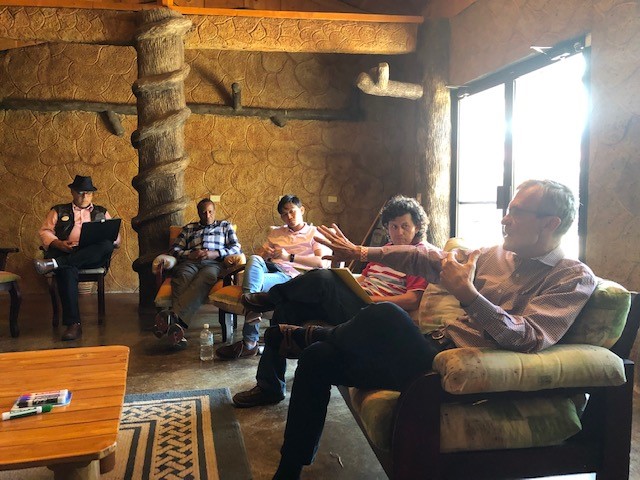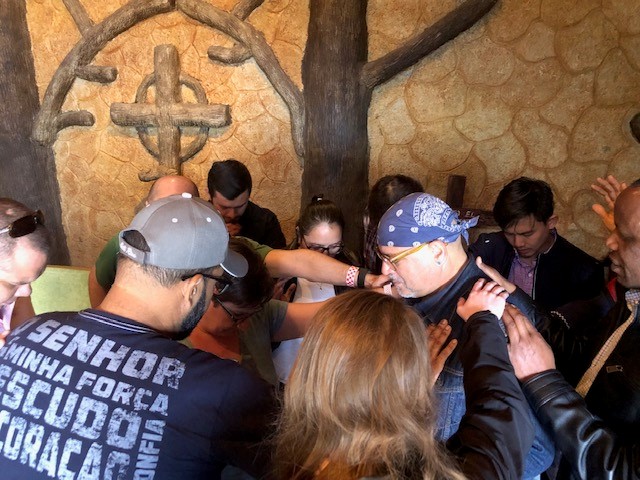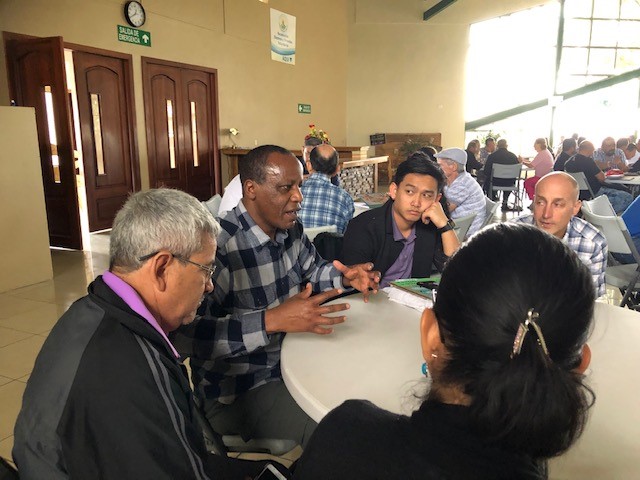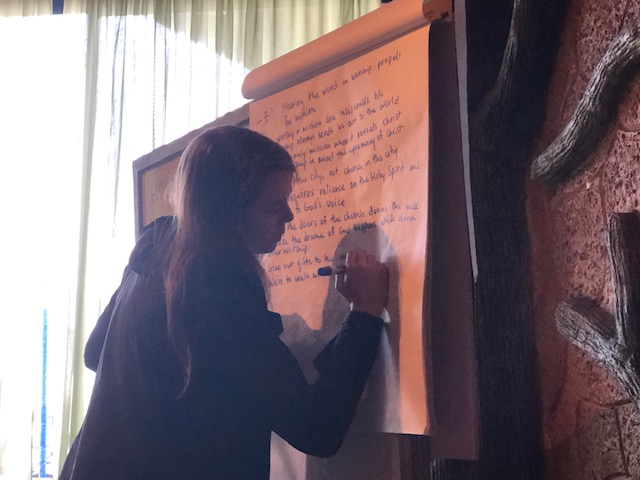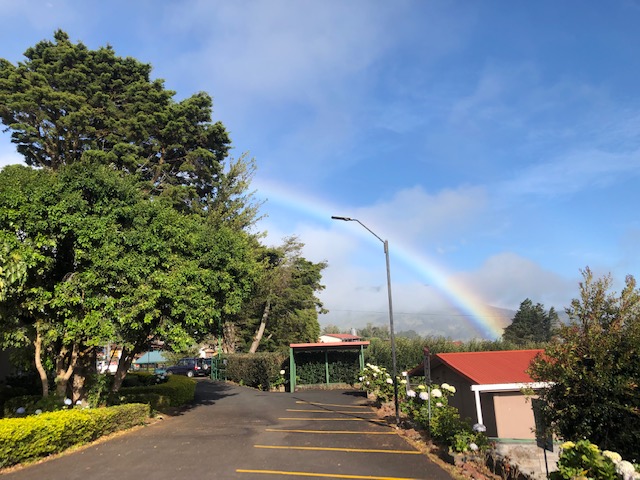Worship and Mission: Around the world and in our own neighborhoods
by Juan Sarmiento, Associate Director for Mission
Over the last ten months, I have had the pleasure of coordinating a project of The Outreach Foundation that has brought together an intergenerational group of mission and worship leaders from a variety of Presbyterian and Reformed congregations and ministry contexts around the United States. The focus of our interaction has been around these questions:
How are worship and mission interrelated in the Presbyterian/Reformed tradition?
What can we learn from the reflection and practices of Presbyterian/Reformed churches in other countries?
What specific practices may help our congregations embody that interrelation in our own contexts?
The project has been made possible through funding from Lilly Endowment Inc. through the Vital Worship program of the Calvin Institute of Christian Worship. The grant gave us the opportunity to read and discuss related books, hear from practitioners from around the world and come together in Franklin, TN. In addition, some of us were able to gather in Fraijanes, Costa Rica from March 14 to 19 to interact with a great group of leaders from 11 Latin American Countries in addition to Kenya and Nepal.
Below are some of the reflections from the participants:
Hilary Ritchie- Minister of Worship and the Arts at Hope Church in Richfield, MN.
I am so grateful to have been able to build relationships with the people on our team and in Costa Rica and across Latin America. We cannot underestimate the value of relationships, even though relationships are not particularly measurable. For instance, we spent Sunday evening at the home of one of the members of Shalom Church. We spent the evening sharing stories and songs, praying for each other, and enjoying food together. There was a deep spirit of love and fellowship during that time, despite (or maybe because of) our differences in language and country of origin. The Holy Spirit was at work knitting together the body of Christ in ways deeper than, but not excluding, language or cultural customs.
As a musician, I also valued the opportunity to make relationships with the other musicians on the trip. Music is a great bridge for relationships, and I was honored to be able to play alongside the musicians I met in Costa Rica. In particular, I was able to share songs with one of our Brazilian friends. I hope to use his songs in my church here in the United States!
In addition to the relationships made, I was deeply inspired and challenged by the ministries we heard about. Many of the pastors who presented during the summit come from places of unimaginable pain and violence. These pastors do not flee from evil, but run into it head on, knowing that only the power of God could conquer the forces of darkness. What struck me time and time again was the way that the pastors are not content to remain in their churches. They are active, going out into their communities to bring the Good News to those who need to hear it most. As a worship minister, I often conceive of my work as taking place within the sanctuary, so there is not the same kind of impulse to move outward. I let our missions pastor take care of that. Hearing these pastors talk, though, I realize that I cannot be content to remain in the sanctuary. I, too, need to move out and love those hurting in our community, so they might experience the healing that Jesus gives. Then they might find a home in our sanctuary. And even if not in ours, we will join together to worship in the new heavens and new earth.
Finally, the way that Shalom Church funds their ministry gave me a new way to think about supporting our ministry. This visit was particularly good timing because our church is in the beginning stages of a building campaign. We are thinking about how to best use our property for the good of the community. The way that Shalom built businesses to fund their ministries in the community helped me see that my church could do something similar so that we could have a flourishing ministry in our city.
We must do the work that needs to be done for the good of God’s kingdom, not the good of our particular church. Like Shalom, I hope that my church can be motivated by one vision: to see God’s kingdom come in our community.
Branden Hubbell- Director of the Leadership Institute Program at Kingdom Story Ministries. Tacoma, WA
I have been exceedingly blessed by the opportunity to go to Costa Rica with the Outreach Foundation. It was my first time in Costa Rica and the experience was more than I can include in one reflection. I was overwhelmed by the relational aspect of the culture. Their willingness to receive us, their hospitality, and their devotion to Jesus have all changed me forever.
I came back to my home in Tacoma, WA with a different set of eyes. I saw down in Costa Rica the fruit of what it means to serve practically in our cities. In America, we have government services that help keep our streets clean and trash picked up, but down there it is a different story, as it is in much of the world. But even in America, those services can’t get to everything. In my own home town, I am seeing places I have traveled by often with new eyes. I am seeing the brokenness, the places that need the love of Jesus. Simple things like picking up the trash that is left behind. It doesn’t compare to other places, but it is still garbage that should be picked up. Not a single church in my area does garbage clean-up in the city. My own ministry is going to begin to change that. It will be a part of our regular discipleship process that you will learn the city, the places where it is broken, and learn practical ways to help express God’s love to the world. It doesn’t take special gifting or lots of training, just a willing and obedient heart.
Jesus tells us that if we are faithful with a little, God will entrust us to be faithful with much. I have always had grand ideas about helping our city, yet some of the simplest and easiest ways to help eluded me because of the blind spots I have due to my culture. I kept striving to hopefully show God that I could be faithful with much, but I wasn’t being faithful with the few, the simple, and the easy. So much can be learned from simply picking up trash: faith, humility, obedience, love, joy, surrender, the list goes on.
Most of the Pastors at the conference were in cities where gang violence, prostitution, and drug trafficking are the norms of everyday life. Where people in their cities and congregations are dying every day because of the above problems. Yet, in the darkness, God called each one of those pastors, to love and to serve in places where the people of those cities believe there is no hope. They were faithful with the small things as they started in the city and God blessed them with a transformed city. Story after story of entire cities transformed by the Love of Jesus. I learned that God not only wants to transform the individual, but He also wants to transform the city. God bless you, may God meet you in the depth of your heart to draw out the champion He created in you.
Rev. Roy Palavacini- Ethnomusicologist with ample experience among indigenous populations and urban contexts in Europe, the United States and Latin America and was ordained by the Christian Reformed Church in North America.
Thinking about our consultation on “Worshiping Missionally” plus “La Cumbre de Servidores” I have some reflections or lessons learned.
How easily we strangers, can get together as brothers and sisters. In other words, become family as Jesus said In Mt 12:46-50. I believe this is part of our missional journey to recognize new family. Different than I am, but real family because we worship the same God.
In relation to the musical worship. It was extremely nice to see and feel that everybody considers their own musical language, genre, or style the most appropriate way to worship God and desires to share it others. However, finally, we came to understand that every way, every music, every cultural, social, or ethnic expression is the “appropriate way to worship God through music” in its own context or amongst the presence of people that sees it as their own.
In relation to our conversation and reflections about worship and mission, we realized that every mission or missionary work must be done in the context of worship. With every action, deed or what we do as an expression of God’s mission, what we must look for is what Jesus said to the woman at the well, that God seeks those who worship in spirit and truth. It looks like that is the ultimate goal of God’s mission.
God is still in control of everything.
Personally, I can say that it was a divine providence, which took me to that event. God had prepared some needed encounters with people that I needed to meet, see and start to mend a broken relationship.
I thank the Lord of the mission, who deserves all worship for taking me to this Consultation and Summit. I am also grateful to The Outreach Foundation.
We are truly grateful to Shalom Teaching Ministries for having hosted this meaningful consultation of Worship and Mission in the context of their Servant-Leaders Summit and to Dr. Bill Dyrness (Dean Emeritus of the School of Theology at Fuller Theological Seminary) for having shared some very helpful theological and historical considerations that helped frame our time together.

